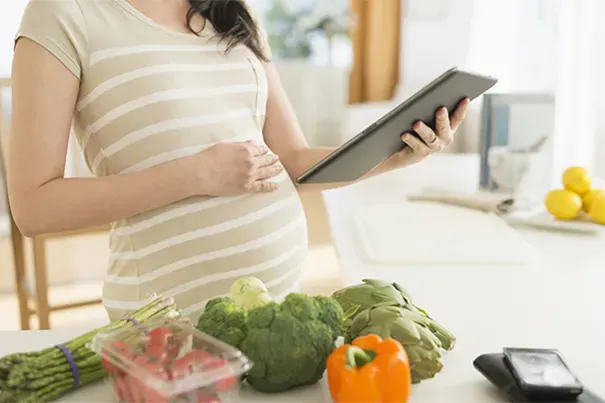Protein-Rich Foods for Pregnancy Diet
Pregnancy is an exciting and crucial time for both you and your baby and it is not unknown that eating a balanced diet is key to staying healthy. One of the most important elements of your diet during this time is protein. Protein isn't just for building muscles; it's also essential to repair different parts of your body like your brain, muscles and blood, all of which go through changes during pregnancy. Plus, it gives your baby the energy needed to grow. In this blog, we'll talk about the importance of protein during pregnancy, how much you need and which protein-rich foods for pregnancy are the safest and most practical.
Importance of protein during pregnancy
Protein plays a vital role in the growth and development of the baby. Amino acids or the building blocks of proteins play numerous roles from forming and maintaining the structure of the muscles, bones and skin to producing critical hormones for the growth of the baby. Eating enough protein-rich foods during pregnancy aids your baby's development as amino acids are essential for regular cell growth and function. Achieving your daily intake of protein during pregnancy can also reduce the risk of complications such as foetal growth restriction and premature labour.
How much protein do pregnant women need?
The amount of required protein during pregnancy varies based on factors such as how far along you are, weight and physical activity level. Generally, experts recommend that pregnant women consume about 75 to 100 grams of protein per day[1] . This is a significant increase compared to the daily intake recommended for non-pregnant women. It's important to consult with your healthcare provider to determine the exact amount you need based on your individual circumstances.
Protein-rich foods for pregnancy
1. Dairy Products
Milk, cheese and yoghurt are excellent sources of high-quality protein: casein and whey. They are also high in dietary calcium, phosphorus, B vitamins, magnesium and zinc which are beneficial in the baby’s growth. Yoghurt, especially Greek yoghurt, contains probiotic bacteria that support the digestive system of the mother-to-be. There are also other greek yoghurt benefits for pregnancy, making it a perfect addition to a healthy, pregnancy-safe diet.
2. Legumes
Legumes like lentils, peas, beans, chickpeas, soybeans, and peanuts are great sources of fibre, protein, iron, folate and calcium — all of which your body needs more of during pregnancy.
3. Sweet Potato
Sweet Potatoes are rich in beta-carotene that converts into vitamin A in the body. It is a good source of protein and fibre, making you feel full while reducing your blood sugar spike and improving digestive health.
4. Salmon
Eating salmon while pregnant can boost your intake of omega-3 fatty acids, which are essential in the development of the baby’s brain and eyes. While consuming salmon while pregnant is considered safe, it is best to avoid certain seafood that are high in mercury. The list of seafood to be avoided during pregnancy includes- swordfish, shark, king mackerel, marlin, bigeye tuna and tilefish from the Gulf of Mexico
5. Eggs
Eggs are a versatile and affordable source of protein. They also contain choline, which is important for brain development.
6. Broccoli and Green Leafy Vegetables
Broccoli and green leafy vegetables like spinach have many nutrients including fibre, vitamin C, vitamin K, vitamin A, calcium, iron, folate and potassium.
7. Lean Meat
Lean meats such as chicken and turkey are excellent sources of high-quality protein. They also provide essential nutrients like iron and zinc, which are crucial during pregnancy.
8. Berries and Whole Grains
Berries like strawberries, blueberries and raspberries contain a high amount of healthy carbs, vitamin C, fibre and antioxidants and a low glycemic index making them a perfect flavourful snack option. Whole grains like wheat, rice, oats, barley and quinoa contain a fair amount of protein, as well as B vitamins, fibre and magnesium.
9. Nuts and Dried Fruits
Nuts and dried fruits are generally high in calories, fibre and various vitamins and minerals. Try adding a small portion of trail mix with dates, nuts and seeds to your diet as a healthy protein and fibre-filled snack.
Is protein powder safe?
If you're looking for simple ways to increase your intake of protein during pregnancy, supplements like protein powders might seem like an easy solution. However, if you are already eating protein-rich foods for pregnancy and taking your prescribed prenatal vitamins, adding supplements to your diet may be unnecessary.
Protein powders and other supplements often contain a large amount of protein in a concentrated form. Excessive consumption of protein while pregnant can do more harm than good. Therefore, it's essential to follow a balanced approach.
It is therefore advisable for pregnant women to eat protein-rich foods for pregnancy to meet their daily protein intake. If you still feel the need to include protein powders in your diet, consult your healthcare provider before you start taking any supplements.
FAQs
You, you can meet your daily protein requirement by including vegetarian-sources of protein like legumes, nuts, seeds and paneer. If you are a vegan, you can replace the paneer with tofu.

